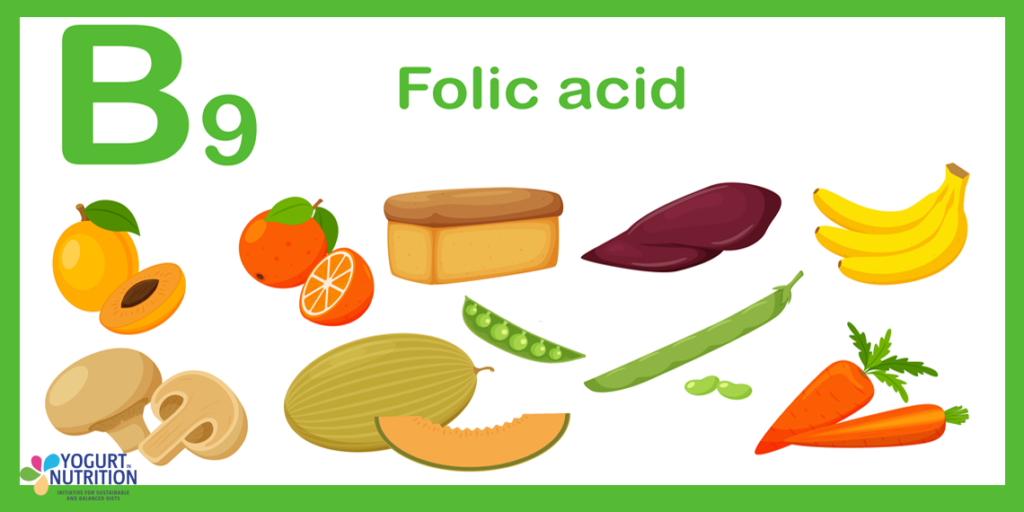B vitamins are a complex of vitamins, grouping together several organic substances. Each vitamin plays specific roles on health. This time, we will focus on vitamin B9, also known as folic acid or folate.
Vitamin B9: functions and metabolism
Folate, also known as vitamin B9, is an essential hydro-soluble vitamin that plays a critical role in various physiological processes. It is particularly important in DNA synthesis, cell division, and amino acid metabolism, making it crucial for growth, development, and overall health.
One of its primary functions is in nucleotide synthesis, where it facilitates the production of purines and pyrimidines, the building blocks of DNA and RNA. This is vital for rapidly dividing cells, such as those in the bone marrow, intestines, and developing fetus.
During pregnancy, folate is especially important for fetal neural tube development. Adequate intake helps prevent neural tube defects such as spina bifida and anencephaly. Spina bifida involves incomplete closure of the spine and spinal cord, while anencephaly is a severe condition where parts of the brain and skull fail to develop properly. This is why folic acid supplementation is widely recommended for women of childbearing age.
Folate also plays a key role in homocysteine metabolism by working with vitamins B6 and B12 to convert homocysteine into methionine, an essential amino acid. As a result, vitamin B9 helps regulate homocysteine levels. Since elevated homocysteine is linked to a higher risk of cardiovascular disease, folate is crucial for maintaining heart health.
Furthermore, folate supports red blood cell production, helping prevent megaloblastic anemia, a condition characterized by large, immature red blood cells that impair oxygen transport.
Folate and vitamin B12 share many functions in the body. They both work together to create our genetic material (DNA), form healthy red blood cells and support the normal functioning of the brain and nervous system.
Dietary Recommendations for folate
Folate is the generic name for a group of compounds. Folate is the natural form of the B9 vitamin found in foods and in the body. Folic acid is its synthetic form, used in supplements or fortified foods.
The nutritional needs of folate vary by age, sex, and physiological conditions such as pregnancy and lactation. The recommended daily intake is typically expressed as Dietary Folate Equivalents (DFE) to consider the differences in how naturally occurring folate and synthetic folic acid are absorbed by the body:
- 1 mcg DFE = 1 mcg food folate (naturally occurring)
- 1 mcg DFE = 0.6 mcg folic acid from fortified foods or dietary supplements consumed with foods
- 1 mcg DFE = 0.5 mcg folic acid from dietary supplements taken on an empty stomach
The dietary reference value for healthy adults (over the age of 18) varies between 330 mcg (Europe) (2,4) and 400 mcg DFE per day (USA) (1)(depending on the local guidelines).
During pregnancy and lactation, needs can go up to 600 μg and 500 μg DFE per day:
- Pregnant women require 600 mcg DFE/day due to the increased demand for fetal growth and neural tube development. A daily supplement of 400 mcg of folic acid is recommended before conception and during early pregnancy. However, according to a French 2021 National Perinatal Survey, less than a third of women say they started vitamin B9 supplementation before they became pregnant, even though this is recommended (3).
- Lactating women need 500 mcg DFE/day to support infant growth and development.
Individuals with certain medical conditions (e.g., malabsorption disorders, alcoholism) may require higher folate intake or supplementation.
Dietary Sources of Vitamin B9

The sources of vitamin B9 are
- Natural sources: Leafy green vegetables, legumes, citrus fruits, avocados, or liver (1).
- Fortified foods: Many countries mandate folic acid fortification in cereals, flour, and pasta to prevent deficiencies (3).
- Supplements: Often necessary for pregnant women and individuals at risk of deficiency.
Dairy products contribute to the daily intake of B9 vitamin, even if there are not considered as a major source. Milk, yogurt and cheeses may contain 5 to 12 mcg/100g of folate.



